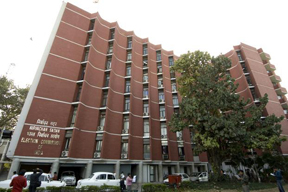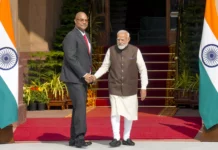 NEW DELHI: Political parties will avoid making promises which are likely to vitiate the purity of election process and will have to spell out the rationale of promises made and the means of financing them in their manifestos, the Election Commission has said.
NEW DELHI: Political parties will avoid making promises which are likely to vitiate the purity of election process and will have to spell out the rationale of promises made and the means of financing them in their manifestos, the Election Commission has said.
In the draft guidelines for election manifestos issued by the EC today in the wake of Supreme Court directions to it, the parties and contesting candidates will be allowed to make only such welfare promises in their manifestos that are enshrined in the Directive Principles of State Policy of the Constitution.
“The election manifesto shall not contain anything repugnant to the ideals and principles enshrined in the Constitution and further that it shall be consistent with the letter and spirit of other provisions of Model Code of Conduct,” the EC said in its guidelines to check parties from announcing freebies as part of their manifestos.
In the interest of transparency, level playing field and credibility of promises, the poll body expects that manifestos reflect the rationale for the promises and the ways and means to meet the financial requirements for it.
“Trust of voters should be sought only on those promises which are possible to be fulfilled,” the EC order said.
The draft guidelines will be finalized and formally incorporated in the Model Code of Conduct after comments/suggestions from all political parties. The EC has asked all national and state parties to send their reactions to it by February 7.
Majority of the parties had earlier objected to the EC’s intervention in putting checks on election manifestos and the promises made by them.
“While the Commission agrees in principle with the point of view that framing of manifestos is the right of the political parties, it cannot overlook the undesirable impact of some of the promises and offers on the conduct of free and fair elections and maintaining level playing field for all political parties and candidates,” the EC said. The EC said, “These guidelines will then become part of the Model Code of Conduct and will be applicable to all future elections.”
It said Article 324 of the Constitution mandates the EC to conduct elections inter alia to Parliament and state legislatures and has thus directed that political parties and candidates while releasing manifestos for any election shall adhere to the guidelines so issued.
The Supreme Court had in its July 5, 2013 judgment directed the EC to frame such guidelines to check parties from making announcements of freebies of all kinds to woo voters.
The EC held a meeting with various parties on the issue on August 12 last year where conflicting views emerged from the parties, with a majority opposing any such move by it.
The apex court judgment had said, “Although, the law is obvious that the promises in the election manifesto cannot be construed as ‘corrupt practice’ under Section 123 of RP Act, the reality cannot be ruled out that distribution of freebies of any kind, undoubtedly, influences all people. It shakes the root of free and fair elections to a large degree.”
“…we are mindful of the fact that generally political parties release their election manifesto before announcement of election date, in that scenario, strictly speaking, the Election Commission will not have the authority to regulate any act which is done before the announcement of the date.
Nevertheless, an exception can be made in this regard as the purpose of election manifesto is directly associated with the election process.” -PTI






